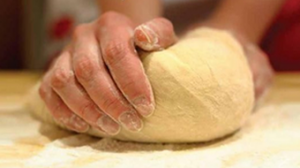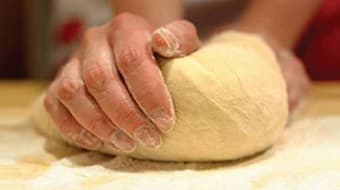
I certainly didn’t start my weekly tradition of baking challah due to a lack of kosher bakeries in my neighborhood.
Living in the Five Towns (Long Island, NY), one could safely say that there are more kosher food establishments than we know what to do with. Despite that, I have not felt the need to purchase and challah in years, because baking challah has simply become part of my Friday. The aroma fills every inch of my home, whetting appetites and symbolically letting us know that soon enough, it will be time to say, “Good Shabbos.”
While I am not the most spiritual person in the world, I certainly appreciate that baking challah is an “elevated” process. You are keenly aware that what is being baked isn’t just any other recipe. The multi- step process requires patience, coordination, time and an actual prayer – and there is nothing else I make in my kitchen that includes all of these elements each time it is made. That alone makes me stop and take pause, reminding me that what lies ahead is unlike anything else.
Dahlia Abraham-Klein’s new release “Spiritual Kneading Through the Jewish Months” introduces bakers to a completely new level of spirituality connected to the baking of challah. Written almost like a textbook complete with syllabus, monthly challah baking groups use the connection of women to each rosh chodesh (new month) to engage in discussion, reflection and meditation through the challah baking process. Each chapter has a different challah recipe thematically associated to a particular month. Various breathing techniques are also detailed in each chapter and are meant to accompany the natural rhythm created by dough kneading. Ideas or motivations upon which to concentrate during the hafrashat challah stage are provided for each chapter as well. In addition, specific discussion points corresponding to that month and thoughts to ponder which guide the process are provided, all in an effort to ensure the baker remain in the right frame of mind for such a mitzvah.
While one might initially pick up this book thinking it was a cookbook filled with hundreds of challah recipes, that person would be disappointed. Recipes are provided and designed to coordinate with each month, but that is not the goal of the book. It is almost as if the recipes are secondary. More important to the author is the material provided which allows bakers to approach every step as an opportunity to spiritually connect. An impatient reader might skip over the introduction to a cookbook, eager to get to the recipes. In this case, that would also be a mistake as the introduction isn’t optional: it is completely necessary to understand how to use the book effectively.
Abraham-Klein wants her readers to appreciate that this spiritual mindset begins as early as shopping for the necessary ingredients. When she explains that her recipes call for, “organic and fair trade ingredients that have been grown with a holistic, ecological and balanced approach to farming,” it is in an effort to “use the finest ingredients to make (our) challah because every component contributes to the physical and spiritual quality of the final product.”
The significance of each actual ingredient is also explained. The oil can be thought of as “softening us, making us sensitive to other’s needs,” says the author, as the eggs can also “allude to a woman’s special role in creation, “ reaffirming that every cog in this process contributes to the level of spirituality one can reach through this holistic approach to baking challah.
A good speaker knows his/her audience before taking the podium. If you don’t know who you’re talking to, how can you ensure you can communicate effectively? Ms. Abraham-Klein certainly speaks to a particular readership and following, but as previously mentioned, I am not of the overly spiritual sort. Many of her suggestions and correlations were lost on me – the cynical New Yorker who has no faith in organic produce to provide anything more than providing more bugs. I do respect her ability to connect spiritually through this process and applaud her for sharing these techniques with a greater audience, as her writing appropriately reflects her passion for the topic.
As for this challah baker, I do not believe that my connection to challah baking is any “less” of an experience even if Ms. Abraham-Klein’s approach does not speak to me. One’s spirituality and closeness to G-d is personal and often private and she should continue to do what works for her. What works for me, however, is the overwhelming satisfaction I feel as my family enjoys the fresh challah I’ve baked that day, providing a sh’laymut and connection to G-d better than anything else ever could.
The words of this author reflect his/her own opinions and do not necessarily represent the official position of the Orthodox Union.

